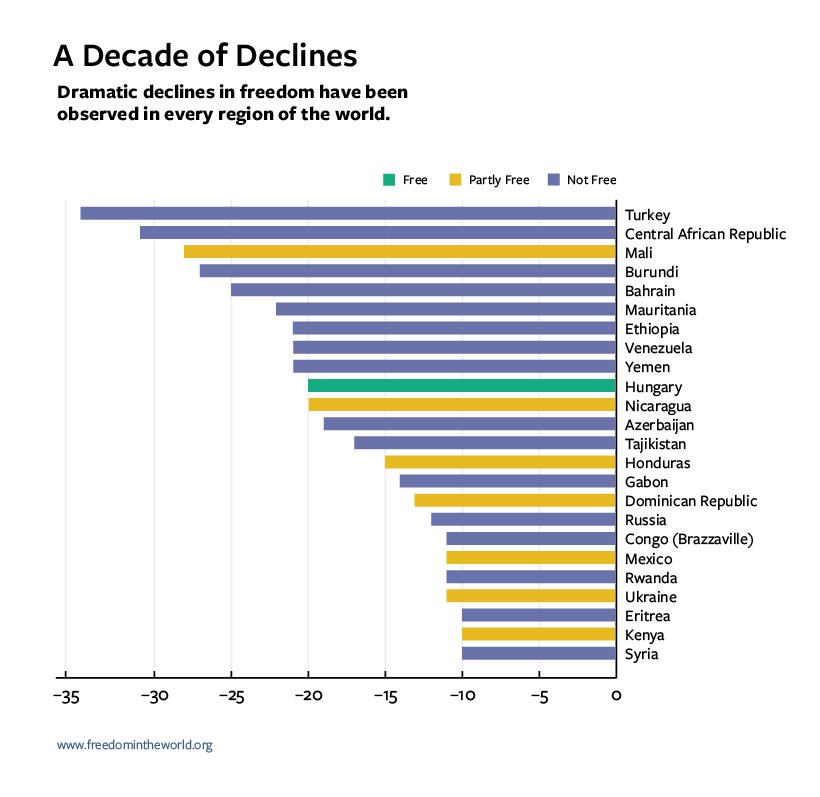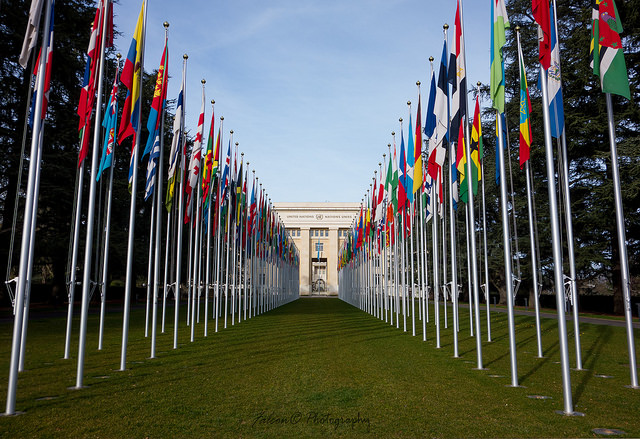The overall status of democracy and freedom did not improve throughout the world last year. In fact, many of the most fundamental and basic human rights came under attack in countries across the globe, according to a report by Freedom House released on Tuesday.
The annual report, titled “Democracy in Crisis”, details which countries became freer and more oppressed during the last year.
Freedom, democracy, and human rights have been declining throughout the world for the 12th year in a row. Basic rights such as free and fair elections, the protecting of minorities, free speech, and the rule of law all saw attacks, the NGO said.
Recent years have seen the return of autocrats and the faltering of the preexisting democracies. Countries that seemed promising are now sliding further from democracy and more towards authoritarianism. Stronger, more stable democracies have also been weakened by terrorist attacks, insufficient handling of refugees and minorities, and economic hardships.


According to Freedom House, fear continues to take a more sizable hold in stable democracies. Far right parties and sentiments continue to gain more and more ground in countries such as France, Germany, and the U.S. The report argues that these groups grow stronger by peddling distrust of minorities and already firm institutions such as the media. Autocracies sacrifice the rights of some groups in order to boost up the rights of another one.
Freedom House continues to argue that it is in the interest of every nation to promote democracy and freedom within its borders but to also encourage these positive practices in their neighbors. Firm democracies tend to be more resistant to autocratic leaders that seek to exploit people and extremists that aim to remove people’s most basic rights. Fragile governments lack the stability to resist these negative pressures and thus fall into disarray more easily. This disarray allows chaos and economic downturn to fester which can then spread to neighboring countries.
Number of ‘Not Free’ Countries Continues to Rise
Freedom House counted 25 percent of the world’s countries, a total of 49, along with 37 percent of its population to be “not free”. Nations such as Syria, Somalia, and Libya continue to be crippled by civil war and rivaling factions that prevent the growth of healthy democracy. Other countries such as Uzbekistan, North Korea, and Eritrea are overseen by cruel police states that enforce strict rules with little room for dissent. These nations do not represent all 49 of the “not free” nations, but they are listed as the “worst of the worst”.
Saudi Arabia ranks 7th on the “worst of the worst” list because of its absolute monarchy, strict fundamentalist ideology, and expansive state police. King Salman has been replaced by his eldest son, Prince Mohammed bin Salman, who has begun an expansive campaign to reform Saudi Arabia into a much more modern and welcoming society in order to make it more appealing to the rest of the world.
Myanmar took massive steps backwards just as it had been taking small steps forward over the previous years. A civilian leadership was elected in 2015, however the military still retains vast amounts of power within the government. The military then carried out a systematic genocide against the Rohingya, a mainly Muslim minority in the western state of Rakhine. Mass shootings, rape, and arson have been widely reported by refugees. Questions still linger over whether or not the Rohingya will be welcome back in Myanmar, if they will be compensated for their material losses, or if the country will even change at all despite these atrocities.
US Promotes Less Freedom Abroad and at Home
America’s “Freedom in the World Aggregate Score” fell from 89 to 86 last year. Freedom House argues that President Donald J. Trump has weakened America’s freedom by undermining the credibility of the media, engaging in nepotism, failing to clearly separate his businesses from his government duties, and abandoning many transparency practices that were common amongst his predecessors.
The media, intelligence forces, law enforcement, and judicial system have all faced onslaughts from the president at one point or another. The blaming of the media as “fake news”, and the added implication that the press seeks only to ruin Mr. Trump, depicts the media as an enemy within the state that cannot be trusted.
Freedom House concludes that these assaults have left U.S. institutions weakened but not broken. However, they do not write off the reality that sustained attacks over a period of time could cause “…serious consequences for the health of U.S. democracy and America’s role in the world.”
America May Not be the Vanguard of Democracy
The United States began shying away from its previous role as promoter of democracy and freedom throughout the world. Mr. Trump made the case that America was greatly weakened and that we needed to retreat from the world stage in order to spend time mending our wounds.
Freedom House notes that Mr. Trump’s expressions of friendship and closeness with leaders of some of the most autocratic and least free countries, such as Saudi Arabia and the Phillippines, is shocking to much of the democratic world. It is a stark contrast to the missions of previous administrations, that of which would espouse the values of democracy at most opportunities and then would do their best to follow through with that vision. The United States has also became much more unwilling to confront authoritarian regimes throughout the world and to support other democratic nations, or groups, that actively want to combat these regimes.

